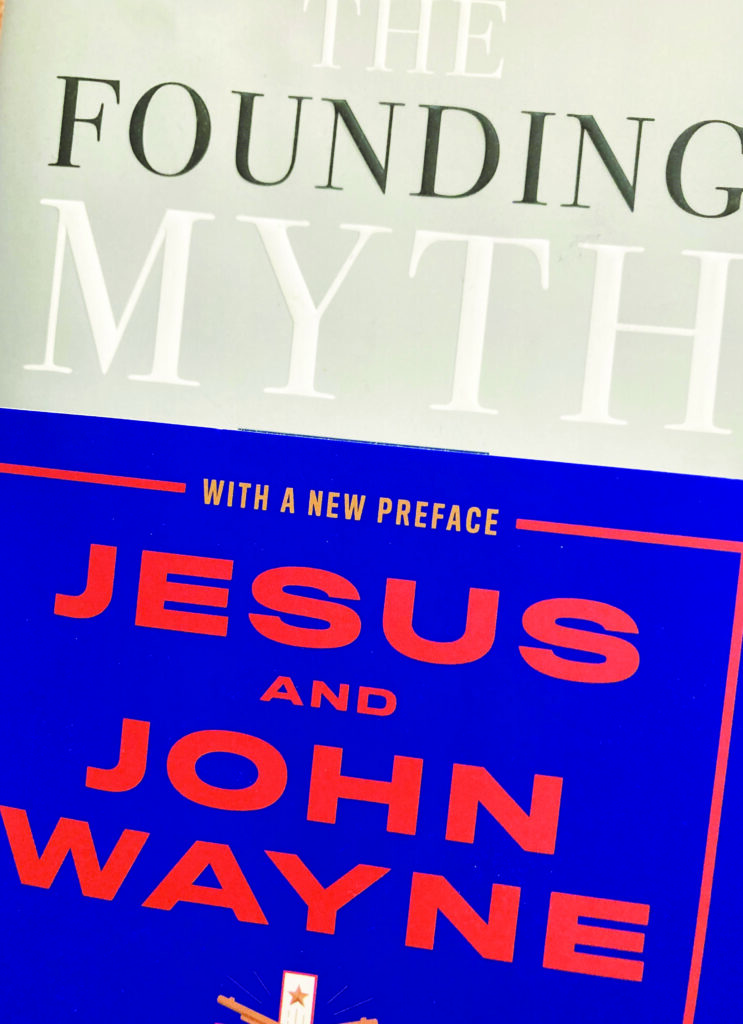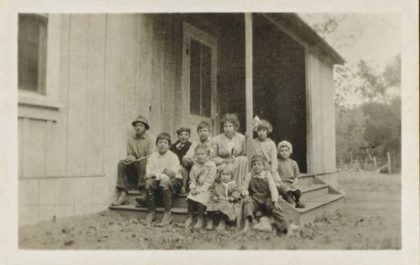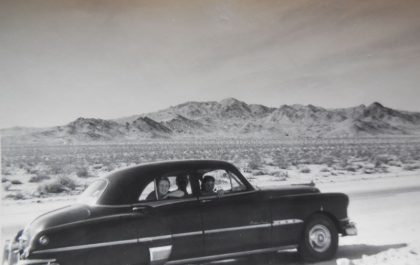
“Do not think that I have come to bring peace to the earth. I have not come to bring peace, but a sword.”
– Matthew 10:34, Holy Bible (English Standard Version)
In The Founding Myth: Why Christian Nationalism is Un-American, constitutional attorney Andrew L. Seidel asks: What happens when the political history of the United States is hijacked by a religious group laying claim to the idea that the precepts of their religious faith are synonymous with the precepts of the country itself?
In Jesus and John Wayne: How White Evangelicals Corrupted a Faith and Fractured a Nation, history professor Kristen Kobes Du Mez asks the follow-up question: In turn, what are the ramifications when leaders of this same religious group encourage their followers to reshape the nation’s political, social, and cultural landscape; all based upon the imaginary history they have concocted for themselves?
Together, Seidel and Du Mez answer these questions by exposing the efforts of white Christian nationalists to do nothing less than undermine the socio-cultural fabric of this nation by attacking its legal and political foundations.
Andrew L. Seidel investigates claims made by Christian nationalists that ours is a Christian nation founded upon Christian principles. The wide body of historical evidence presented in The Founding Myth debunks these unfounded claims. Most urgently, the views being proffered actually amount to an existential threat to religious freedom and the critical need to separate church and state. Religious freedom exists in this country “only because there is no government-endorsed religion…”
Citing colonial governments of the pre-Revolution era, Christian nationalists offer examples of settlers and Pilgrims seeking religious freedom as evidence that we are a Christian nation. The problem is that these groups were not seeking religious freedom, they were seeking religious autonomy. As Seidel writes, some of these colonial governments were indeed “established on Christian principles and the bible… But when the founders were inventing America, they rejected [them] as examples of what to avoid.”
References to a higher power in the Declaration of Independence are also held up as proof that we are a Christian nation. However, this document did not create the nation and its laws; it is a statement of principle upon which a nation should be built according to “the Laws of Nature and of Nature’s God…” This is not the manner in which Christians speak of their god.
And, even as Christian nationalists rhetorically juggle other references in this document as verification of their claim – “creator” “divine Providence” “Supreme Judge of the world” – no word of “Jesus,” or “Christ,” or “Christian” appears.
“The references [to a higher power in the Declaration] specify, at most, a broad deism,” Seidel concludes, which “is the belief that a god or supernatural being created the universe but has played no role in events since.” Most importantly, “deism has no organized structure or religion.”
Seidel cites constitutional scholar Geoffrey Stone, who states that “in acknowledging Nature’s god… the Declaration carefully and quite consciously eschewed any invocation of the Christian religion.”
Years later, when the legal framework of our government was created during the Constitutional Convention, delegates repeatedly expressed the necessity of separating church and state. And, again, “Jesus” and “Christ” and “Christian” are nowhere to be found in this undeniably secular document.
“The founding documents of the United States,” Seidel avers, “revere and protect freedom above all else. The [Christian] bible worships and demands the opposite: obedience, submission, and servility. And it secures that obedience through fear.” Indeed, the bible’s principles stand in direct opposition to a nation founded, not by Christ, but by “We the People.”
The founding fathers were men of the Enlightenment whose views on Christianity and the Bible are well documented; in contemporaneous form and in the written record they crafted after-the-fact when trying to figure out what it all meant. The record is clear that the founders of this country rejected the superstitious in favor of reason.
Even among those few founders who were indeed devout Christians, it was clearly understood that the country they were creating was not to be based upon their religion, or any other. This is, perhaps, the single most significant feature of the American “experiment.” Never before had a country been founded upon the liberty and individual rights of the people. The primary threat to the success of this experiment was, and is today, religiously driven tyranny.
Arguments are made by Christian nationalists that: “In God We Trust” on our currency, “under god” in the pledge of allegiance and, “so help me god” in the presidential oath, are all evidence of Christian America. None of these phrases are found in the founding documents of this country. Indeed, they are the creations of Christian nationalist forebears who capitalized upon historical moments of fear in an attempt to squeeze their god into public spaces.
Unlike avowed atheist Andrew Seidel, Kristin Kobes Du Mez is a Christian who teaches history at a “world-class Christian university… grounded in Christian conviction.” She argues in Jesus and John Wayne that many white Evangelicals have capitalized upon Christian nationalist sentiment and, in doing so, have become a pre-eminent force of socio-cultural and political division.
While evangelical Christians are taught to live in fear of eternal damnation, white Christian nationalists have been rallied to fear “the other” here on earth. As Du Mez writes, “Generations of evangelicals learned to be afraid of communists, feminists, liberals, secular humanists, “the homosexuals,” the United Nations, the government, Muslims, and immigrants…”
For example, white Christian nationalism thrived during the Cold War’s battle with “godless communism.” The dissolution of the Soviet Union left a void, conveniently filled by 9/11. In 2002, 70 percent of evangelical leaders agreed that Islam was “a religion of violence” that was “dedicated to world domination.” Evangelist Franklin Graham described Islam as “a very evil and wicked religion.” Another evangelical leader, Pat Robertson, claimed that Muslims are “worse than Nazis.” Another said that most Muslim social organizations were “fronts for violent jihadists.”
Barack Obama’s election gave white Christian nationalist fear-mongering an American face. Twenty-nine percent of white evangelicals believed that Obama was a Muslim and another 42 precent claimed not to know.
A Colorado Springs, Colorado pastor pointed out that Obama’s election “could be the best thing that ever happened to the evangelical cause.” As Du Mez offers, “militant evangelicalism was always at its strongest with a clear enemy to fight.”
Other fears have been stoked under the guise of protecting America’s borders. Social media is overflowing with misinformation claiming that radical left-wing socialists are trying to cancel American culture. Many white Christian nationalists have been taught that Black Lives Matter is a violent terrorist organization while ignoring the fact that, as reported by TIME Magazine in September of 2020, 93 percent of BLM protests during the long hot summer of 2020 were peaceful.*
“Part of politics is having the right friends,” says evangelist Ralph Reed, “but an important part of politics is having the right enemies.”
The latest results from the US Census Bureau show the nation, for the first time in its history, with a declining white population. One can only imagine how this development will be manipulated to energize white Christian nationalists.**
In order to impose their will upon the country, evangelicals have re-imagined Jesus Christ himself. No longer content with a soft-spoken, long-haired, sandal-wearing, loving Jesus; white Christian nationalists have hyper-masculinized their savior into a warrior. “To join the church of Jesus Christ,” as Du Mez writes “is to enlist in God’s army…”
A vast consumer empire markets evangelical propaganda to a captive and exclusive audience through radio and TV programs, movies, youth conferences, clothing, and more. Perhaps most significant is the centralized book distribution network, the Christian Booksellers Association, which ensures that their offerings align with their militant agenda. In Point Man: How a Man Can Lead His Family, best-selling evangelical author Steve Farrar says that “Leading a family through the chaos of American culture is like leading a small patrol through enemy-occupied territory. And the casualties in this war are as real as the names etched on the Vietnam Memorial.”
Evangelical pastor Mark Driscoll, who eventually established fifteen churches, outfits Jesus with Old Testament brutality. He claimed that, “Sure God was a pacifist, but only at the end of the age, only after he kills all his enemies. In the meantime, God created men for war.”
By 2015, generations of evangelicals had been raised in this militant environment and they overwhelmingly supported Donald J. Trump as a modern-day John Wayne. “Evangelicals,” Du Mez writes, “shared Trump’s nostalgia for heroic white manhood [and] restoring white patriarchal power would make America great again.” Family values be-damned.
“Having replaced the Jesus of the Gospels with a vengeful warrior Christ,” Du Mez concedes, “it’s no wonder many came to think of Trump in the same way.”
“Despite evangelicals’ frequent claims that the Bible is the source of their social and political commitments,” Du Mez concludes, “evangelicalism must be seen as a cultural and political movement rather than as a community defined chiefly by its theology.”
The massive evangelical consumer culture has united theologically diverse churches under a single cause: the depravity of American culture. A faith has been transformed into a crusade.
And, when one has committed to the crusade, kernels of truth are all that is necessary to demonize the political left as operating in conflict with God’s will. This is especially relevant in an age flooding in conspiracy. Indeed, many of those who argue today that this is a Christian nation also peddle in the favorite creations of the wacky far-right; although “far” implies only those on the fringe. In our case, the “fringe” has grown into a sizable monster of misinformation.
I have long been confused as to how ostensibly educated people can be so oblivious to the basic truths of their own world. No longer; when one is in a holy war, the facts will have to work themselves out later.
*https://time.com/5886348/report-peaceful-protests/
**https://www.wsj.com/articles/census-race-population-redistricting-changes-11628714807




